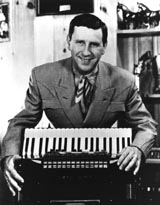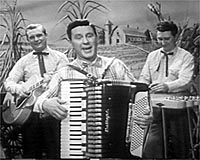| best of all, a consummate professional. In his heyday, Pee Wee King
took country music uptown and didn't ask whether or not it was ready to
go. Bill C. Malone, the dean of country historians, has said, "Pee Wee
King had one of the most important and influential careers in country music.
His personal story virtually sums up a major slice of country music history
from 1937 to the 1960s."
Pee Wee never picked cotton, never hopped a freight train, never
worked as a song plugger in Nashville. He was born Frank Kuczynski on Feb.
18, 1914, in Milwaukee and raised in the middle of the rich dairy country
near Abrams, Wisc. His Polish-American father led a local polka band, and
by the time he was 15, young Frank had gotten his first accordion. Soon
he had formed his own outfit and was busy playing polkas and cowboy music
over area radio stations. Singer Gene Autry, then appearing over WLS Chicago,
heard the band and hired them to be his backup group. It was Autry who
dubbed his new bandleader "Pee Wee," in deference to the fact that, at
5 feet six inches, he was the smallest member of the band and also to distinguish
him from other "Franks" in the band. The "King" part was Pee Wee's own
choice and was borrowed from a then-popular radio bandleader named Wayne
King, whose signature song was "The Waltz You Saved For Me." In later years,
Pee Wee had his name changed legally to Pee Wee King.
In 1934 Autry and Pee Wee moved to WHAS in Louisville, but Autry
soon left to go to Hollywood to start his film career. Though Pee Wee would
later be invited to appear in a number of Autry pictures, he decided to
stay in radio for the time being. He worked for a time with Frankie More's
Log Cabin Boys, travelling around Kentucky and playing at dances and in
tobacco barns. Soon Pee Wee decided to organize his own band, "I called
them The Golden West Cowboys," he recalled. "There was a duet act on WLS
then called The Girls of the Golden West, and I had a terrific crush on
them." This first band included fiddler Abner Sims, singer Little Texas
Daisy, guitarist Curly Rhodes and a young Tennessee boy who had been playing
fiddle in a local band, Redd Stewart. In 1935 Pee Wee also met a girl named
Lydia Frank who had been singing over Louisville radio. Her father, Joe
L. Frank, was a nationally known promoter who had handled Autry and radio
acts like Fibber McGee and Molly. Pee Wee liked Frank but liked his daughter
even more, and in 1936 he married her. He also gained the services of Frank
as the band's new manager.
It was through Frank that The Golden West Cowboys came to the Grand
Ole Opry stage in June 1937. Pee Wee was very much enthralled with some
of the new swing bands on the air -- especially Bob Wills, Louise Massey
and the Westerners and Clayton McMichen's Georgia Wildcats -- and he began
to incorporate their new sounds into his music. The fans loved it, but
the conservative Opry managers were nervous: Pee Wee wanted to bring on
electric guitars, he wanted to use drums, and he wanted to use "chase"
music to play people off and on stage. He was one of the first Opry members
to carry a musician's union card and one of the first to have special costumes
designed for his band. While the Opry in the late '30s was a far cry from
the overalls and feed sacks of the show in the 20s, Pee Wee added a new
sense of professionalism to the show. The band soon became a triple-A farm
club for aspiring singers: in St. Louis' Kiel Auditorium, Pee Wee met young
Eddy Arnold, who jumped at the chance to join the Cowboys. "He didn't even
know how much we were going to pay him," Pee Wee laughed. Later singers
included yodeler Becky Barfield, Tommy Sosebee, Milton Estes and Cowboy
Copas. The Cowboys were also the first to back Minnie Pearl on recordings,
and toured with her as well.
During the war years, Pee Wee won thousands of new fans with his
coast-to-coast tours of military bases as part of The Camel Caravan. In
the early 1940s the troupe travelled from Rhode Island to the Panama Canal
Zone, putting on great shows and tossing out packs of Camel cigarettes
to grateful G.I.'s. During this time, band member Redd Stewart began playing
an instrumental he had worked up called "The No Name Waltz," and the band
began using it as a theme. Then one night in 1946, as he and Redd were
riding in the luggage truck on their way to a date, they began jotting
down some words to the tune on the back of a matchbook cover. "We had been
listening to Bill Monroe's 'Kentucky Waltz,' which was a big hit at that
time," Pee Wee recalled. "We decided, 'Why not have a Tennessee Waltz?'"
After Nashville music publisher Fred Rose touched it up, the band took
it into the RCA Victor studio in Chicago and, in December 1947, with Redd
doing the vocals, made the first recording. When pop singer Patti Page
recorded it in 1950, it became the biggest country crossover song in history. |

